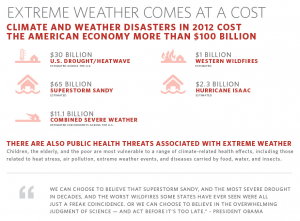 “Myth: The United States can’t stay economically competitive if we address climate change.”
“Myth: The United States can’t stay economically competitive if we address climate change.”
—The Democratic National Committee, Nov. 27 from its “Your Republican Uncle” website
Overview
Cutting carbon emissions carries a cost, and the cost tends to make the United States less competitive. The DNC’s rosy picture of the benefits of climate change mitigation ignores many complications.
The Facts
The Democratic National Committee created its “Your Republican Uncle” website to give Democrats at family holiday gatherings the perfect response to the myths propounded by Republican relatives. In this installment of our “Your Republican Uncle” series of fact checks, we tackle the third of three would-be myths in the “climate” category.
The DNC says its a myth that the United States can’t stay competitive economically while addressing climate change. The DNC offers the following explanation for its claim:
Climate change itself is taking a toll on our economy. In 2012, climate and weather disasters cost the United States more than $100 billion. And right now, other countries are making huge investments in research and development to confront this crisis with new technologies — which means new industries and new jobs. We can’t afford to fall behind them. The longer Republicans deny climate change exists, the further we fall behind.
The DNC offers a single citation in support of the above paragraph, a hyperlink leading to a White House infographic carrying the title “Climate Change and President Obama’s Action Plan.”
Analyzing the Rhetoric
It’s hard to gauge the truth of the DNC’s central claim. What does it mean to compete economically? Every runner in a track competition competes, but if one runner outclasses the rest we might say the rest of the field couldn’t compete with the winner.
To help narrow the meaning, we looked for Republican claims resembling the one the DNC calls a myth. We found a few.
President George W. Bush said he refused to sign the Kyoto Accord since it would wreck the U.S. economy. Republican Speaker of the House John Boehner said cap-and-trade bills would raise energy prices and hurt jobs. Republican Minority Leader Mitch McConnell opposed EPA-proposed carbon limitations based on their economic effects. At minimum, then, some Republicans think measures intended to address climate change would hurt U.S. economic competitiveness.
Are the Republicans right? Would addressing climate change make it harder for the United States to compete economically?
The green economy dispute
Republicans have a plausible case that measures intended to mitigate climate change cause economic hardship. We should note that such proposals differ from one another. One likely effect, however, would see higher prices for energy.
The Heritage Foundation, a conservative think-tank, put forth the case for opposing the Kyoto Protocol (footnote numbers removed):
A recent study notes that many climate policy experts now believe the emissions reductions called for in the Protocol could have an adverse effect on Americans. The study finds, for example, that U.S. productivity following implementation of the Protocol would fall by $100 billion to over $400 billion in 2010. An unrestricted global emissions trading system that includes developing countries could reduce this damage to between $100 billion and $200 billion. Even if developed countries could buy credits from developing countries, they would still pay dearly to attract them at a time when developing nations are focused on economic growth.
The World Wildlife Foundation sponsored a study saying the U.S. economy would benefit from the Kyoto Protocol and energy prices would drop:
This portfolio of policies and measures would allow the United States to meet its obligations under the Kyoto Protocol. Together when combined with steps to reduce the emissions of non-CO2 greenhouse gases and land-based CO2 emissions, and the acquisition of a limited amount of allowances internationally. This package would bring overall economic benefits to the US, since lower fuel and electricity bills would more than pay the costs of technology innovation and program implementation. In 2010, the annual savings would exceed costs by $50 billion, and by 2020 by approximately $135 billion.
Heritage Foundation points out that the United States senate unanimously rejected the Kyoto Protocol, helping show Democrats and Republicans at the time believed the agreement would hurt the economy. We note that both studies stress the importance of low energy prices to economic productivity. Could an energy breakthrough allow a green economy to quickly undercut energy prices from fossil fuel sources? It’s possible. But it’s hard to count on future technological breakthroughs. We’ll leave unsettled whether the green economy will represent a net advance over the fossil fuel economy in the near future. We think Heritage Foundation makes the more convincing case.
The cost of climate and weather disasters
The DNC offers the cost of climate and weather disasters as an economic disadvantage of acting to reduce carbon emissions. The DNC says weather disasters cost the United States more than $100 billion in 2012.
The reader will notice the DNC stops short of claiming the weather disasters occurred as a result of climate change. But the DNC implies the cause-and-effect relationship.
As noted above, the DNC relied on a White House infographic as its source for the $100 billion claim. The White House infographic doesn’t blame the $100 billion cost on climate change, though a quotation of President Obama very strongly implies it. We reproduced the relevant part of the infographic (above right; click image for larger view).
There is no scientific consensus that human-caused climate change is responsible for “Superstorm Sandy” or the effects of drought in 2012.
At most, climate change from greenhouse gas emissions caused a minor part of the $100 billion cost from 2012. Using the $100 billion figure without providing that explanation misleads the audience.
Falling behind?
The DNC warns of other nations investing heavily in technologies intended to address climate change, and the United States can’t afford to fall behind. But of course that depends entirely on the return on investment. The New York Times reports on Europe’s disappointment with its return on investment:
A deep and lasting economic slowdown, persistently high prices for renewable energy sources and years of inconclusive international negotiations are giving European officials second thoughts about how aggressively to remake the Continent’s energy-production industries.
Bloomberg reports investments in renewal energy fell worldwide. The report cites one expert who said part of the drop was explained by the decreased cost of solar panels.
The higher cost of renewable energy serves as its chief economic drawback. The Brookings Institution rates wind and solar power as weaker low-carbon energy substitutes than nuclear, gas and hydroelectric power.
It’s more opinion than fact that the United States can’t afford to fall behind other countries in developing renewable low-carbon energy sources. The increased use of natural gas for generation of electricity, for example, helped the United States meet Kyoto Protocol goals for cutting carbon emissions. The lower cost of gas energy offers a path toward higher investment in research leading to the next generation low-cost energy source. And, of course, spending money on research does not inevitably lead to the desired technological advances.
Republican climate change denial makes the United States fall further behind?
The DNC takes a jab at Republicans by claiming “The longer Republicans deny climate change exists, the further we fall behind.”
We doubt that picking the order of the leaders in renewable energy technology qualifies as an objective pursuit. We therefore question the premise that the United States is behind in developing renewable energy technologies. Nor do we see a literal link between denial of the existence of climate change and developing renewable energy. One may favor developing renewable energy simply for the sake of not running out of energy. We suppose the DNC means to imply that congressional opposition to renewable energy subsidies slows down development of renewable energy technologies. That seems like another proposition grounded in opinion and not verifiable fact.
Do Republicans deny climate change exists? That’s an issue for a separate fact check.
Summary
“Myth: The United States can’t stay economically competitive if we address climate change.”
We failed to find prominent Republicans circulating this would-be myth. We did find some saying climate-change legislation would harm the economy. If all nations address climate change using similar measures then we’d expect the United States to remain economically competitive. So in that sense the DNC accurately calls the idea a myth. That’s not what Republicans have in mind when they say such legislation will hurt the economy, however. That makes the DNC’s argument a straw man fallacy.
“In 2012, climate and weather disasters cost the United States more than $100 billion.”
The DNC’s example of the costs exacted by climate change sets up a logical booby trap. While it’s true drought and severe weather cost about $100 billion in 2012, similar events happen regardless of climate change. If climate change plays a role in the drought and weather costs from 2012, it’s fractional.
“We can’t afford to fall behind them.”
The DNC offers no reliable means of measuring when one nation is ahead of another in developing renewable energy technologies. Technology advances unpredictably, so we see no means of treating this claim as a verifiable fact.
References
“The Democrat’s Guide to Talking Politics with Your Republican Uncle.” Your Republican Uncle. The Democratic National Committee, 27 Nov. 2013. Web. 10 Aug. 2014.
“President Obama’s Plan to Fight Climate Change.” The White House. The White House, 25 June 2013. Web. 19 Aug. 2014.
“Bush: Kyoto Treaty Would Have Hurt Economy.” Msnbc.com. NBCNews.com, 30 June 2005. Web. 11 Aug. 2014.
“Liberating America From Foreign Oil.” JohnBoehner.com. Friends of John Boehner, 09 June 2011. Web. 11 Aug. 2014.
Coon, Charli E. “Why President Bush Is Right to Abandon the Kyoto Protocol.” The Heritage Foundation. The Heritage Foundation, 11 May 2001. Web. 20 Aug. 2014.
Bailie, Alison, Stephen Bernow, William Dougherty, Michael Lazarus, and Sivan Kartha. “The American Way to the Kyoto Protocol: An Economic Analysis to Reduce Carbon Pollution.” Stockholm Environment Institute. World Wildlife Fund, July 2001. Web. 20 Aug. 2014.
Owen, David. “Economy vs. Environment.” The New Yorker. Condé Nast, 30 Mar. 2009. Web. 20 Aug. 2014.
DeBard, Amanda. “Study: Cap and Trade Would Hurt Economy.” The Washington Times. The Washington Times, LLC, 09 June 2009. Web. 20 Aug. 2014.
Cai, Yiyong, Warwick J. McKibben, Adele Morris, and Peter J. Wilcoxen. “Consequences of Alternative U.S. Cap-and-Trade Policies: Controlling Both Emissions and Costs.” The Brookings Institution. The Brookings Institution, July 2009. Web. 20 Aug. 2014.
Greenstone, Michael. “The Benefits of Cap-and-Trade Would Have Exceeded Its Costs.” The Brookings Institution. The Brookings Institution, 30 July 2010. Web. 20 Aug. 2014.
Nichols, Will. “UK Climate Change Policies Have Not Harmed Economy, Report Says.” Theguardian.com. Guardian News and Media, 07 July 2014. Web. 20 Aug. 2014.
Samenow, Michael. “The Whole Truth about Superstorm Sandy and Climate Change.” Washington Post Capital Weather Gang. The Washington Post, 15 Nov. 2012. Web. 20 Aug. 2014.
Fischetti, Mark. “Did Climate Change Cause Hurricane Sandy?” Scientific American. Nature America, Inc., 30 Oct. 2012. Web. 20 Aug. 2014.
Goldenberg, Suzanne. “Climate Change Did Not Cause 2012 US Drought, Says Government Report.” Theguardian.com. Guardian News and Media Limited, 11 Apr. 2013. Web. 20 Aug. 2014.
Reed, Stanley, Stephen Castle, and Melissa Eddy. “Sluggish Economy Prompts Europe to Reconsider Its Intentions on Climate Change.” The New York Times. The New York Times, 16 Jan. 2014. Web. 21 Aug. 2014.
Van Gilder Cooke, Sonia. “Will Austerity Derail Europe’s Clean-Energy Movement?” Time. Time Inc., 10 Feb. 2012. Web. 25 Aug. 2014.
Gosden, Emily. “UK Must Cut Green Goals Back in Line with Europe’s, Manufacturers Say.” The Telegraph. Telegraph Media Group, 22 Jan. 2014. Web. 25 Aug. 2014.
Lesser, Jonathan A. “Rethinking Green Energy Mandates.” Continentalecon.com. Wiley Periodicals, Inc., Aug. 2013. Web. 25 Aug. 2014.
Goossens, Ehren. “Clean Energy Support Falls Again to $254 Billion in 2013.” Bloomberg.com. Bloomberg, 15 Jan. 2014. Web. 25 Aug. 2014.
Matson, John. “Renewable Energy’s Hidden Costs.” Scientific American. Nature America, Inc., 17 Sept. 2013. Web. 25 Aug. 2014.
Related Posts
 Do U.S. fossil fuel power plants kill millions of birds annually?
Do U.S. fossil fuel power plants kill millions of birds annually? PolitiFact’s subjective treatment of Val Demings
PolitiFact’s subjective treatment of Val Demings Was the BCRA Aimed at Reducing the Number of Medicaid Enrollees?
Was the BCRA Aimed at Reducing the Number of Medicaid Enrollees? Does CHIP renewal save $6 billion over 10 years?
Does CHIP renewal save $6 billion over 10 years? Did Sarah Sanders say the diversity visa lottery system does not vet applicants?
Did Sarah Sanders say the diversity visa lottery system does not vet applicants? Fact checkers awry on Trump and nuclear proliferation
Fact checkers awry on Trump and nuclear proliferation


